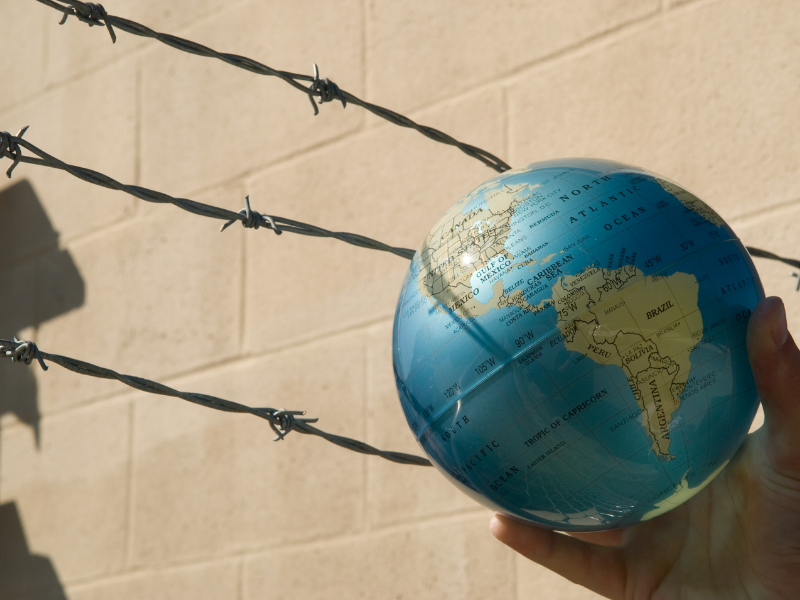Forgive.
 It’s one of those play calls for Team Jesus that has challenged the best and most upright Pastor, Church Mother, and saint at one point or another. When we are hurt, damaged, or betrayed by someone, it’s not in our human nature to naturally forgive.
It’s one of those play calls for Team Jesus that has challenged the best and most upright Pastor, Church Mother, and saint at one point or another. When we are hurt, damaged, or betrayed by someone, it’s not in our human nature to naturally forgive.
Forgiving others will rarely be as easy as breathing or blinking. It takes work and intentionality to begin – and end – the process of forgiveness.
It (Forgiveness) is Finished
But, how can we tell when the process is over? Is forgiveness ever over?
The journey to (and through) forgiveness takes time; it processes us through many phases – from hate, anger, denial, acceptance and back again. I believe there is a point where the process of forgiveness is complete. In my own journeys to forgiveness, the following signs have guided me to rest from the work of forgiveness.
Have you reached these fabulous signs of forgiveness?
1. When you can speak of the offense from a point of reference vs. a point of pain
When you talk about what “they did”, is your context one of reference or reliving the painful situation? When we reference a past event, we simply state that the event happened. We know we’re reliving a situation if we speak about it, and it evokes all of its negative emotions and energy around the subject.
The ability to reference vs. relive a hurtful event doesn’t just fall out of the sky. But, as forgiveness matures in your heart, you will be able to feel less and less pain regarding the incident, until one day you can speak that “it happened” vs. internalizing “the pain that happened to me”.
2. When revenge, payback, retaliation becomes a non-issue.
“Get ‘em, Jesus!” How many can raise their hand in transparency, that you wanted some extreme evil, some deadly disease or misfortune to happen to the one who hurt you? Lord Jesus, please forgive and heal our revenge-like nature!
With hand raised, I can say that when you honestly and truthfully wish the person the best, when you hope no harm comes to them, when they no longer have to pay penance for what they did, your forgiveness has reached a beautiful milestone of completeness.
3. When you’ve stopped hiding behind “I let it go.”
Letting go is absolutely a part of forgiveness. But, how many of our “let go’s” are simply a feeble attempt to avoid conflict and/or bury the pain?
I remember my carefully crafted masks of “that doesn’t bother me anymore” and “I’m really not phased.” All lies! If you’re committed to the forgiveness process and honest with yourself, you’ll eventually learn that buried pain does not equal forgiveness.
Hiding unforgiveness behind denial will only prolong your pain and stunt your healing. It takes work to honestly “let it go”, and when you do, the pain will no longer claw its way back to the surface.
4. When you can fully accept that God loves the offender just as much as He loves you.
Depending on the offense, sometimes it’s hard to comprehend how God can love someone who did something so horrible to us. Remember that God will never forsake others in loyal response to our hurt. God is loyal only to his Word (Psalms 138:2); God is not tempted with evil (James 1:13).
At the onset of our pain, we deem ourselves “higher, or better” than the person who offended us. But, as we walk through forgiveness, our sense of self in relation to the offender miraculously evens out. We’re able to own that we ourselves have done wrong and that we all need God’s love and forgiveness – who gives it freely to us all.
Now, the signs above should not be confused with when to trust a person again. I fully believe that you can forgive someone completely without allowing yourself to trust them again, or give them close access to your heart. The stages of Trust evolve from a pattern of consistent, trustworthy behavior over time (we’ll save that for another post).
So, What’s the Play Call?
For now, sign up, Team! Make that intentional choice to cooperate with the process of forgiveness, and do your work. God’s grace and love will guide you through to the end, where He’s waiting with a big smile and a proud “Well done!”
Tell us about your forgiveness journey in the comments…





I was taunted, and harassed in school, the blessed news is that I forgave them all. I have forgiven swindlers too as well.
I am still learning to forgive totally cause even when I tell myself that I do ,the hurt just not fully gone but I believe I have come a far way so I can let go and let GOD 🙏
Hi, please share on practical steps on forgiveness.
Thank you
Thank you for that…I have forgiven…the offenders..of my “Joseph-like” brethren and sister…However they are still showing evidence of “throw her in the pit and sell her to the Amorites” attitudes and behaviors..so I have chosen not to be associated with them…but I will help, give, and sacrifice for them. My prayer is that God blesses them better them me and that we can all be saved when Jesus comes… I am open to reconciliation always…
I’ve struggled for 7 years to forgive my sister for the hurt she caused myself and my daughter. I’ve read the 5 steps to knowing if you’ve forgiven. I don’t want revenge; I don’t wish her failure; I can definitely think positive thoughts about her such as past good times. I only want a true, heartfelt apology. That’s all I’ve EVER really needed. She’s never offered one. “I’m sorry but….” and pleads her case for why she did what she did and essentially makes it all about her, in my opinion, does NOT an apology make! A pastor friend once… Read more »
I am still learning to forgive. I have truly gotten stronger, but I still carry so much pain because so many people I trusted, hurt me so very very deep.
I, for now…just want to thank you for explaining “how to completely know when one has been forgiven”.
Very helpful and honest!
Thank you so much
Amzing post, thank you 🙏🏾🖤